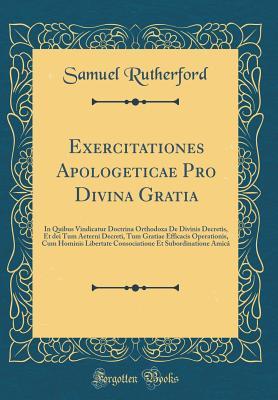- Bible
- Read the Bible
- Bible Versions
- Verse of the Day
- Reading Plans
- Verses by Topic
- Books of the Bible
- Bible Images
- Study
- Commentaries
- Concordances
- Dictionaries
- Encyclopedias
- Sermons
- Bible Atlas & Maps
- BP Wiki
- Devotionals
- Today's Devotionals
- Light of the World
- All Devotionals
- Inspirational Quotes
- More
- Picture Quotes
- Videos
- Inspirational
- Bible Study
- What The Bible Says
- Bible Q&As
- Daily Bread
- Bible by Genre
- Bible Stories
- Random Bible Verse
- Community
- Store
Excerpt from Exercitationes Apologeticae Pro Divina Gratia: In Quibus Vindicatur Doctrina Orthodoxa De Divinis Decretis, Et dei Tum Aeterni Decreti, Tum Gratiae Efficacis Operationis, Cum Hominis Libertate Consociatione Et Subordinatione Amic�
Vere permagna efi copia fcripturire quam parturire mall'et hoc fxculum Vi tam chartaceam nemo non optar. (mor fum ego iraq_ue fcriberem? An qaz'afialmm ignawm perimm param charts an ve ro, quod verius efi, quoniam hoc ha 'bent miferrima deflenda ecclefiae fa ta (enefcente jam mundo ut veritas quae nullum forum reformidat, nullum tribunal perhorrefcit, numquam non in jus quaefiionetn rea pettahatur, theologig jam tantum non arena gladia 2 toria.
About the Publisher
Forgotten Books publishes hundreds of thousands of rare and classic books. Find more at www.forgottenbooks.comwww.forgottenbooks.com
This book is a reproduction of an important historical work. Forgotten Books uses state-of-the-art technology to digitally reconstruct the work, preserving the original format whilst repairing imperfections present in the aged copy. In rare cases, an imperfection in the original, such as a blemish or missing page, may be replicated in our edition. We do, however, repair the vast majority of imperfections successfully; any imperfections that remain are intentionally left to preserve the state of such historical works.
Vere permagna efi copia fcripturire quam parturire mall'et hoc fxculum Vi tam chartaceam nemo non optar. (mor fum ego iraq_ue fcriberem? An qaz'afialmm ignawm perimm param charts an ve ro, quod verius efi, quoniam hoc ha 'bent miferrima deflenda ecclefiae fa ta (enefcente jam mundo ut veritas quae nullum forum reformidat, nullum tribunal perhorrefcit, numquam non in jus quaefiionetn rea pettahatur, theologig jam tantum non arena gladia 2 toria.
About the Publisher
Forgotten Books publishes hundreds of thousands of rare and classic books. Find more at www.forgottenbooks.comwww.forgottenbooks.com
This book is a reproduction of an important historical work. Forgotten Books uses state-of-the-art technology to digitally reconstruct the work, preserving the original format whilst repairing imperfections present in the aged copy. In rare cases, an imperfection in the original, such as a blemish or missing page, may be replicated in our edition. We do, however, repair the vast majority of imperfections successfully; any imperfections that remain are intentionally left to preserve the state of such historical works.
BUY NOW
Hardcover, 560 pages
Published November 14th 2018 by Forgotten Books
© 2025 Bibleportal.com All rights reserved.

Rutherford was also known for his spiritual and devotional works, such as Christ Dying and drawing Sinners to Himself and his Letters. Concerning his Letters, Charles Spurgeon wrote: "When we are dead and gone let the world know that Spurgeon held Rutherford's Letters to be the nearest thing to inspiration which can be found in all the writings of mere men". Published versions of the Letters contain 365 letters and fit well with reading one per day.
Rutherford was a strong supporter of the divine right of Presbytery, the principle that the Bible calls for Presbyterian church government. Among his polemical works are Due Right of Presbyteries (1644), Lex, Rex (1644), and Free Disputation against Pretended Liberty of Conscience.
Samuel Rutherford was a Scottish Presbyterian theologian and author. He was one of the Scottish Commissioners to the Westminster Assembly.
Born in the village of Nisbet, Roxburghshire, Rutherford was educated at Edinburgh University, where he became in 1623 Regent of Humanity (Professor of Latin). In 1627 he was settled as minister of Anwoth in Galloway, from where he was banished to Aberdeen for nonconformity. His patron in Galloway was John Gordon, 1st Viscount of Kenmure. On the re-establishment of Presbytery in 1638 he was made Professor of Divinity at St. Andrews, and in 1651 Rector of St. Mary's College there. At the Restoration he was deprived of all his offices.
Rutherford's political book Lex, Rex (meaning "the law [and] the king" or "the law [is] king") presented a theory of limited government and constitutionalism. It was an explicit refutation of the doctrine of "Rex Lex" or "the king is the law." Rutherford was also known for his spiritual and devotional works, such as Christ Dying and drawing Sinners to Himself and his Letters.
... Show more